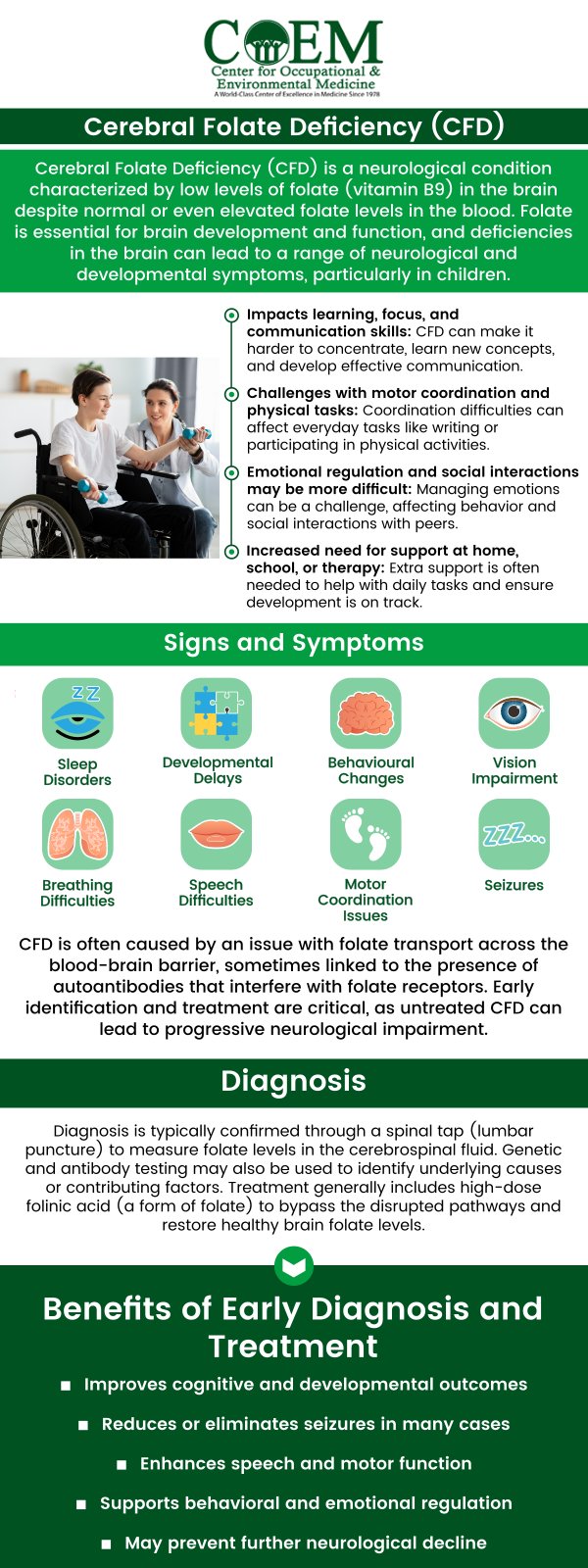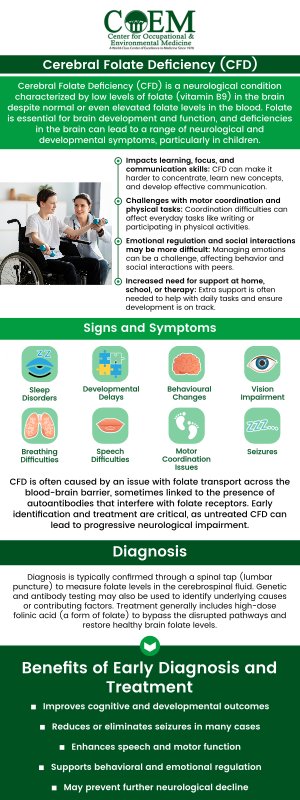Cerebral Folate Deficiency Syndrome Treatment Specialist in Charleston, SC
Cerebral Folate Deficiency Syndrome (CFDS) is a rare condition that disrupts folate transport into the brain, leading to neurological and developmental challenges. It is commonly associated with symptoms such as developmental delays, seizures, and motor coordination difficulties. Our medical team at The Center for Occupational and Environmental Medicine (COEM) offers comprehensive evaluation and treatment to help manage symptoms and improve neurological function. For more information, contact us today or schedule an appointment online. We are conveniently located at 7510 North Forest Drive North Charleston, SC 29420. Patients routinely fly in to be evaluated by COEM, as we serve patients internationally. Find out if you have been exposed, extensive lab testing is available.


Table of Contents:
How is cerebral folate deficiency syndrome diagnosed?
How does cerebral folate deficiency syndrome affect the brain?
What conditions are associated with cerebral folate deficiency syndrome?
What are the long-term effects of untreated Cerebral Folate Deficiency Syndrome?
Cerebral folate deficiency syndrome (CFDS) is diagnosed through a combination of clinical evaluation and laboratory testing. Physicians begin by taking a detailed history of developmental and neurological symptoms in both children and adults. These symptoms often include developmental delays, seizures, difficulties with motor coordination, language skills, and sometimes psychiatric symptoms like irritability or mood disturbances. Since these signs overlap with other neurological disorders, the process requires a careful approach to rule out other potential causes before confirming cerebral folate deficiency.
A spinal tap, also known as a lumbar puncture, is commonly performed to measure folate levels in the cerebrospinal fluid (CSF), which serves as a key diagnostic marker. Additionally, genetic and antibody testing may be conducted to detect the presence of folate receptor alpha autoantibodies, which can disrupt the transport of folate into the brain. This is a critical part of the diagnostic process, as it helps to determine if the condition is linked to an autoimmune reaction.
The specialists at The Center for Occupational and Environmental Medicine (COEM), including Dr. Stephen P. Elliott, MD, who is the only MedMAPS-certified fellow in the area, combine their clinical experience with the patient’s medical history and test results to form a comprehensive diagnosis. By integrating laboratory findings with observations of neurological function, motor skills, and cognitive development, providers can better understand the impact of the deficiency on the patient’s overall health. This thorough evaluation ensures an accurate diagnosis and enables the development of an individualized treatment plan that addresses the patient’s specific needs.
Cerebral folate deficiency syndrome (CFDS) disrupts the availability of folate within the central nervous system, leading to a range of neurological problems. Folate plays a crucial role in neurotransmitter synthesis, myelin production, and overall brain development, which is vital for maintaining healthy brain function. Without sufficient folate in the cerebrospinal fluid, neurons struggle to communicate effectively, and the developing brain in children may not progress as expected. This often results in developmental delays, motor coordination difficulties, and impaired cognitive growth. The condition can also affect language acquisition and social functioning. Many children with cerebral folate deficiency experience regression in speech or fail to develop expressive language skills at the expected rate. Some children may show behaviors that overlap with those seen in autism spectrum disorders, such as social difficulties and repetitive behaviors.
In adults, low levels of cerebral folate may contribute to mood disturbances, seizures, or progressive neurological decline, depending on the severity and duration of the deficiency. Over time, the brain’s inability to maintain proper folate metabolism can worsen these neurological issues, creating a cycle of impairment that becomes more difficult to correct the longer it remains untreated. For this reason, early recognition and intervention are critical. With the proper support, including tailored folate supplementation, neurological function can often improve, and in children, developmental progress may resume more steadily.
Cerebral folate deficiency syndrome (CFDS) is associated with a range of neurological and developmental disorders. One of the most significant associations is with autism spectrum disorders (ASD), where many children diagnosed with autism later show abnormalities in folate transport within the brain. These findings underscore the importance of testing children with autism for underlying metabolic or immunological issues that might be contributing to their symptoms. Cerebral folate deficiency has also been linked to epilepsy, motor coordination disorders, and progressive neurological conditions. Seizures are particularly common and often present as one of the first noticeable symptoms in children. Motor difficulties, such as poor balance, ataxia, or tremors, may also develop, significantly impacting daily life if not addressed.
Adults are not excluded from these associations, as low cerebral folate levels may play a role in mood disorders, cognitive decline, and other neurodegenerative processes. The specialists at COEM are recognized worldwide for their expertise in evaluating whether cerebral folate deficiency is contributing to neurological concerns across age groups. By connecting this condition to broader neurological disorders, providers can take a more comprehensive and effective approach to care.
When cerebral folate deficiency syndrome remains untreated, the long-term consequences can be significant. In children, developmental delays tend to persist and may worsen over time, affecting language, motor function, and social interaction. Some children experience a regression of skills they had previously acquired, leading to significant challenges in learning and communication. Without proper treatment, these developmental hurdles can become permanent and limit independence later in life. Seizures are another potential outcome when cerebral folate deficiency goes unmanaged. Uncontrolled seizures can interfere with daily function, increase the risk of injury, and contribute to further neurological damage. Motor impairments also tend to progress, with balance, coordination, and fine motor skills becoming increasingly difficult. In adults, untreated cases may lead to cognitive decline, chronic mood disturbances, and a worsening of neurological symptoms over time.
Folate supplementation tailored to the patient’s needs can help restore function in many cases, with children often experiencing improvements in development and adults stabilizing or even reversing certain neurological symptoms. The providers at COEM bring decades of experience to helping patients avoid these long-term consequences by identifying the deficiency early and providing individualized treatment strategies that support both brain health and overall quality of life.
Cerebral folate deficiency syndrome treatment is available at The Center for Occupational and Environmental Medicine (COEM). For more information, contact us today or schedule an appointment online. We are conveniently located at 7510 North Forest Drive North Charleston, SC 29420. We serve patients from Charleston SC, Mount Pleasant SC, Summerville SC, North Charleston SC, Goose Creek SC, Ladson SC, Hanahan SC, James Island SC, John’s Island SC, Daniel Island SC, West Ashley SC, Moncks Corner SC, Sullivans Island SC, Folly Beach SC, Isle of Palms SC and all of South Carolina, Nationally, and Internationally. Patients routinely fly into Charleston to be evaluated by COEM and to enjoy this beautiful city, which is a Condé Nast and Travel and Leisure Top Domestic and International Tourist Destination.

Check Out Our 5 Star Reviews


Additional Services You May Like
- Functional Medicine
- Allergy and Autoimmunity
- Asthma and COPD
- Autoimmune Diseases
- Allergy and Immunology
- Anti Aging Medicine
- Autism and Children
- ADHD
- Bacterial Infections
- Chemical Toxicity
- Candida Fungal Problems
- Cancer Treatment
- Chronic Illness
- Chronic Inflammatory Response Syndrome (CIRS)
- Chronic Fatigue
- Cardiovascular Disease
- Carbon Monoxide Poisoning
- Chelation Therapy
- Depression
- Environmental Medicine
- Ear Ringing and Dizziness
- Fatigue Treatment
- Fertility and Preconception Care
- Gut Health
- Heavy Metal Toxicity
- Hormonal Imbalances
- Headaches and Migraines
- Hormone Balancing (Men & Women)
- Hepatitis
- Integrative Medicine
- Independent Medical Evaluations
- Influenza
- Lab Testing
- Mold Toxicity
- Malnutrition
- Neurodegenerative Disease
- Natural Hormone Balancing For Women
- Preservative-Free IV Therapy
- Stomach Acid Imbalance
- Smoking Cessation Program
- Skin Therapy (Anti-Aging)
- Swine Flu
- Thyroid
- Mold Toxicity
- Vitamin D
- Weight Loss Program
- Women’s Breast Health Formula

Additional Services You May Like
- Functional Medicine
- Allergy and Autoimmunity
- Asthma and COPD
- Autoimmune Diseases
- Allergy and Immunology
- Anti Aging Medicine
- Autism and Children
- ADHD
- Bacterial Infections
- Chemical Toxicity
- Candida Fungal Problems
- Cancer Treatment
- Chronic Illness
- Chronic Fatigue
- Cardiovascular Disease
- Chronic Inflammatory Response Syndrome (CIRS)
- Carbon Monoxide Poisoning
- Chelation Therapy
- Depression
- Environmental Medicine
- Ear Ringing and Dizziness
- Fatigue Treatment
- Fertility and Preconception Care
- Gut Health
- Heavy Metal Toxicity
- Hormonal Imbalances
- Headaches and Migraines
- Hormone Balancing (Men & Women)
- Hepatitis
- Integrative Medicine
- Independent Medical Evaluations
- Influenza
- Lab Testing
- Mold Toxicity
- Malnutrition
- Neurodegenerative Disease
- Natural Hormone Balancing For Women
- Preservative-Free IV Therapy
- Stomach Acid Imbalance
- Smoking Cessation Program
- Skin Therapy (Anti-Aging)
- Swine Flu
- Thyroid
- Mold Toxicity
- Vitamin D
- Weight Loss Program
- Women’s Breast Health Formula










